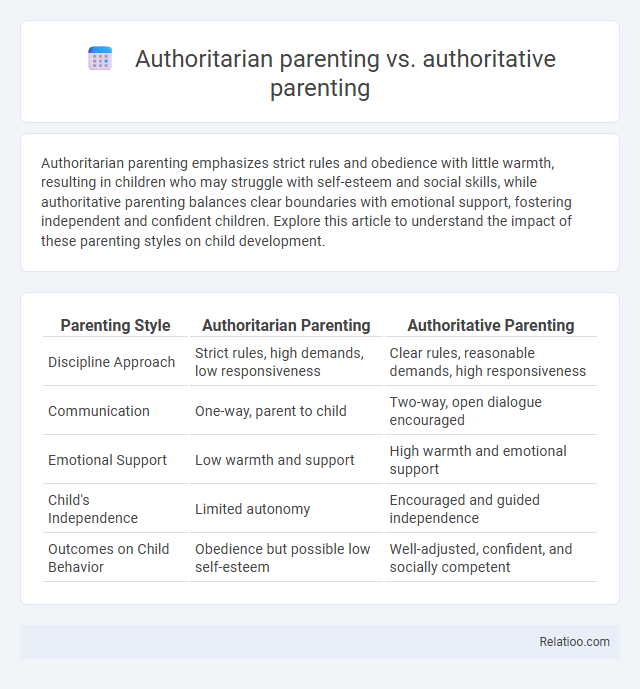Authoritarian parenting emphasizes strict rules and obedience with little warmth, resulting in children who may struggle with self-esteem and social skills, while authoritative parenting balances clear boundaries with emotional support, fostering independent and confident children. Explore this article to understand the impact of these parenting styles on child development.
Table of Comparison
| Parenting Style | Authoritarian Parenting | Authoritative Parenting |
|---|---|---|
| Discipline Approach | Strict rules, high demands, low responsiveness | Clear rules, reasonable demands, high responsiveness |
| Communication | One-way, parent to child | Two-way, open dialogue encouraged |
| Emotional Support | Low warmth and support | High warmth and emotional support |
| Child's Independence | Limited autonomy | Encouraged and guided independence |
| Outcomes on Child Behavior | Obedience but possible low self-esteem | Well-adjusted, confident, and socially competent |
Understanding Parenting Styles: Authoritarian vs Authoritative
Authoritarian parenting is characterized by strict rules, high demands, and low responsiveness, often leading to obedience but reduced child autonomy and increased power struggles. Authoritative parenting balances firm guidelines with emotional support and open communication, promoting healthier child development and social competence. Understanding these distinct parenting styles helps caregivers foster positive relationships while minimizing conflicts and power struggles within the family dynamic.
Defining Authoritarian Parenting
Authoritarian parenting is characterized by strict rules, high expectations, and little warmth or open communication, often leading to obedience through punishment rather than understanding. In contrast, authoritative parenting balances firm guidelines with emotional support, fostering independence and healthy development. Your approach to discipline can influence whether power struggles emerge, with authoritarian methods frequently triggering conflict due to their rigid control.
Defining Authoritative Parenting
Authoritative parenting combines high responsiveness with high demands, promoting open communication and setting clear, consistent boundaries that support a child's autonomy and self-regulation. Unlike authoritarian parenting, which emphasizes strict rules and obedience, authoritative parents encourage independence while maintaining structure and discipline. This balanced approach reduces power struggles, fostering mutual respect and positive behavioral outcomes in children.
Core Principles of Authoritarian Parenting
Authoritarian parenting emphasizes strict discipline, obedience, and high demands with low responsiveness, relying on punishment over dialogue to enforce rules. Core principles include clear expectations, immediate compliance, and limited warmth, often leading to power struggles as children seek autonomy. In contrast, authoritative parenting balances firm rules with emotional support, fostering cooperation rather than conflict.
Key Traits of Authoritative Parenting
Authoritative parenting is characterized by high responsiveness and clear, consistent boundaries that promote independence and self-regulation in children. Unlike authoritarian parenting, which relies on strict discipline and control, authoritative parents encourage open communication and support their child's emotional development. You can foster a positive parent-child relationship by balancing firm expectations with empathy, avoiding power struggles that often arise from rigid authority or permissiveness.
Impact on Child Development: Authoritarian Approach
The authoritarian parenting style, characterized by strict rules and high demands with low responsiveness, often leads to increased risks of lower self-esteem, anxiety, and poor social skills in children. This approach can stifle a child's autonomy and creativity, potentially resulting in compliance out of fear rather than internalized values, which negatively affects emotional development. In contrast, authoritative parenting, which balances firmness with warmth, generally promotes healthier psychological adjustment and stronger cognitive and social outcomes in children.
Effects of Authoritative Parenting on Children
Authoritative parenting fosters independence, self-regulation, and social competence in children through balanced discipline and emotional support. Your child benefits from clear expectations combined with warmth, which promotes higher academic achievement and better psychological well-being. Unlike authoritarian styles that may cause rebellion or anxiety, authoritative parenting encourages open communication and adaptive problem-solving skills.
Discipline Techniques: Comparison and Outcomes
Authoritarian parenting employs strict discipline techniques characterized by high demands and low responsiveness, often leading to obedience but increased risk of anxiety and low self-esteem in children. Authoritative parenting balances firm discipline with warmth and open communication, promoting self-regulation, higher academic achievement, and better social skills in Your child. Power struggles arise when parental control clashes with the child's desire for autonomy, frequently resulting in defiance and strained relationships unless managed through consistent, empathetic discipline strategies.
Long-Term Consequences: Academic and Social Results
Authoritarian parenting often leads to lower academic motivation and poorer social skills due to excessive control and lack of emotional support, while authoritative parenting fosters higher academic achievement and better social competence by balancing clear expectations with warmth and responsiveness. Power struggles in authoritarian households can result in increased behavioral problems and diminished self-esteem, negatively impacting both academic focus and peer relationships over time. Your child's long-term success benefits most from authoritative parenting, which encourages independence and social confidence.
Choosing the Right Approach for Your Family
Authoritative parenting, characterized by clear communication, empathy, and consistent boundaries, fosters healthy child development and emotional intelligence, unlike authoritarian parenting which relies on strict rules and punishment often leading to power struggles. You can avoid confrontations and build mutual respect by encouraging open dialogue and balancing firmness with warmth. Choosing the right approach for your family means prioritizing strategies that support your child's autonomy while maintaining clear expectations and guidance.

Infographic: Authoritarian parenting vs Authoritative parenting
 relatioo.com
relatioo.com